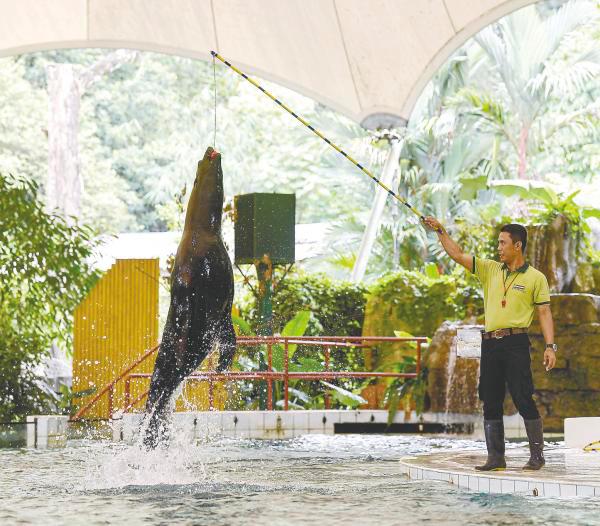PETALING JAYA: The public should realise land animals are not the only ones suffering abuse and that marine animals are exploited just as much due to being trapped underwater in cramped glass and concrete tanks, said Peta Asia vice-president Jason Baker.
Peta (People for the Ethical Treatment of Animals) is an international animal rights nonprofit organisation.
“When talking of animal abuse, people normally think it just involves land animals such as dogs or cats. What most don’t realise is that mammals held captive in marine parks and aquariums are also victims of abuse as they are forced to spend their entire lives trapped in tiny tanks.”
Baker told theSun that the public should empathise with the mammals and send a strong message to the operators of such marine parks and aquariums by boycotting them.
In its latest Southeast Asia-wide campaign, Peta collaborated with Taiwan-based Malaysian-Australian singer, actress and model Kimberley Chen, who appears in its campaign poster and videos. The poster shows her appearing distraught and trapped underwater in a cramped glass tank with the words “A Tank Is Not A Home”.
In the video, the “Fragile” singer said she collaborated with Peta for the campaign “to let people know what it’s like to be captured and stuck in a tank your whole life”.
“I hope the public will see that there are so many better ways to understand and appreciate our marine life than to have them captured and confined in small tanks for public amusement.
“Dolphins and other marine animals held captive at these parks are kept in miserable tanks where they’re unable to dive deep, feel the ocean currents, or do anything else that’s natural and important to them.”
Chen said they are very sensitive animals that belong in the ocean and are not meant to be exploited by marine parks for human entertainment.
In collaborating with Peta, she has joined a long list of celebrities including American actress, model and animal rights activist Maggie Q, Chinese Mandopop singer and actor Han Geng, and Golden Horse Award-winning Taiwan-Hong Kong actress Shu Qi.
Baker said in their natural environment, whales, dolphins and other marine animals live in large, complex social groups and swim vast distances in the open ocean. But at marine parks, they can only swim in endless circles inside tiny tanks, often causing them to suffer depression.
“They are also forced to perform meaningless tricks, used for interactive experiences during which the public is allowed to pet or kiss them, and are often torn away from their families when they’re shuffled between parks. Many have shorter lifespans compared with the natural life expectancy of their species.”
He said governments around the world are recognising that dolphins and other cetaceans do not belong in tanks, with Canada, Chile, Costa Rica and Croatia having banned the practice of keeping them in captivity.
“But in Taiwan, countless marine mammals continue to be held captive, including beluga whales, dolphins, sea lions, seals and manatees, which were captured in the wild and trained to perform demeaning tricks and interact with visitors.”
In 2023, orca whale Lolita, 57, which was held captive for more than 50 years, was released by the new owners of Miami Seaquarium. Lolita, also known as Tokitae, was held captive since 1970 when she was part of a pod of 80 orcas rounded up off the Pacific northwest coast of the US.
In 2022, the last Indo-Pacific bottlenose dolphin kept in a South Korean aquarium was released into the wild after 17 years following months-long rehabilitation, said its Ministry of Oceans and Fisheries.









